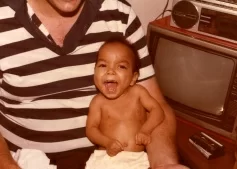 without a thought on my part. But Luke came to my mind yesterday and I looked up some information on him and discovered that his birthday had just passed. I found this old article that I wrote about Luke a few years ago. I thought I'd share it again. I am convinced that there are important and significant lessons we can learn from his life, and that I need to regularly share what I think they are. I hope you enjoy this!
without a thought on my part. But Luke came to my mind yesterday and I looked up some information on him and discovered that his birthday had just passed. I found this old article that I wrote about Luke a few years ago. I thought I'd share it again. I am convinced that there are important and significant lessons we can learn from his life, and that I need to regularly share what I think they are. I hope you enjoy this!The mysteries of God are a part of the Christian life that can often lead to confusion, doubt and even discouragement for believers.
- For some, it's a pride thing. We want to have answers – we want to understand, to be able to grasp the complexities of Biblical truth and God's plan for mankind.
- For some, God's mysteries – the unexplained things of life – are stumbling blocks to faith:
1. Why do bad things happen to good people?
2. Why does He allow pain, suffering and evil to thrive in our world?
Several months ago we were witnesses to the aftermath of the tragedy in Pennsylvania involving the Amish community, where, good, decent, hard working, non violent people were subjected to unspeakable cruelty towards their children. How can this happen?
3. One of our CSC children, who grew up in the worst poverty imaginable in Cebu City, was adopted into a family in the United States several years ago. Well meaning people would tell her how lucky she was and how God obviously had a wonderful plan for her life. She had a hard time with that and would sometimes ask her parents, "But what about all the kids who are still there, who weren't adopted, and who are still suffering and dying? What is God's wonderful plan for their lives? Why me and not them?
For many of us, we celebrate the goodness of God in our lives, we praise him for his healing, for material comforts, for blessing our efforts – even as we observe people who remain sick or disabled, who suffer in poverty – those who efforts and initiatives end in disappointment and ruin.
There are two extremes in terms of people's reactions to the things about God and life that are not understood.
1. There are those who try in vain to grasp the ungraspable – to be able to reduce the mysteries to understandable formulas or explanations. I remember a young seminarian who came to Cebu and who filled the pulpit of our church on a Sunday evening. He preached for an hour on the "peace of God that passes all understanding." Perhaps he felt that if he preached long enough he could crack that nut and open our understanding!
We all know those who have reduced the book of Revelation to precise charts and timetables, giving us easy to understand categories for all of human history and, most especially, the times to come.
2. A second category are those who shake their heads and say, "We'll only know these answers when we get to heaven." They suspend inquiry, not bothering to seek answers to the perplexing questions of life.
Living and working in a Third World country like the Philippines brings some of these mysteries to the front of our lives. Poverty, and all that goes with it, is "in your face." People often ask me "How do you like living in the Philippines?" That's a tough one to answer. Life anywhere has its highs and lows. Some days are great, others are difficult. I often answer this way:
1. When I'm sitting down to a nice breakfast I am aware that, within a few meters of my house are families that have no breakfast.
2. When I'm driving to the office or the Shelter I often pass people walking along the road who, for lack of a few cents can not even afford public transportation and must walk.
3. When I stop to buy medicine for my family or the CSC kids, there are people standing nearby whose children are dying for lack of that very same medicine.
Why am I blessed and they are not?
I recall a conversation with a missionary a few days after Cebu was hit by a strong typhoon. Many of our CSC workers lost their roofs or their entire homes. The houses of the poor were devastated by the high winds and torrential rains. The missionary said that it had been such a miracle how God spared the missionary homes from damage, holding his hands of protection around us during the storm. I remember wondering whether it wasn't more a matter of our having cement houses and strong metal roofs.
Why did our CSC kids have to suffer so much? And how much more, those who live on the street and cannot be admitted to CSC?
These are tough questions. When it comes to trying to understand our own suffering, the Bible gives some answers. For example, Romans 5:3-4 tells us that suffering produces perseverance, perseverance character, and character, hope. And the Bible gives us additional hope that we will someday come to see God's purpose and mysteries:
"But now we see through a glass dimly, but then face to face."
And we hear the testimonies of Christian brothers and sisters who have lived through terrible times and have turned negatives into positives in their lives.
Several months ago I was attending a conference in Bismark, North Dakota. One of the featured speakers was Steve Saint, Steve's father, Nate Saint, was one of the five missionaries killed in 1956 by Aucan warriors in Equador. Steve told about what that tragic day meant to his family, and what it was like when his dad, his hero, didn't come home that day. We saw video of his current family life, and saw a man who was interacting with Steve's children, and who was being referred to as "Uncle." It turns out that this was the very man who had killed Steve's father, who had come to know Jesus and had experienced the forgiveness of God and of the Saint family and now was a part of their family – an amazing story of how good things had come out of tragedy and suffering.
So the clear message is that God has a plan for our lives, we will discover that plan in the right time. He is writing our life's stories, but some of the chapters are difficult ones.
We can understand this. We can, when aided by the Holy Spirit, see how difficulties and suffering are part of a purification process for us, and that we, like Job, will eventually be better people for it.
But what about people who, because of major disabilities, are unable to understand their situation, unable to discern the hand of God or his plan for their lives. Where is the purification and growth and ultimate value for these people? What could God's purpose possibly be?
Back on 1982 a baby was born in a charity ward in a small hospital in Cebu City. 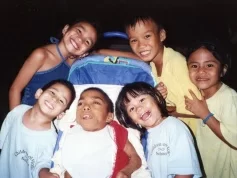 The baby underwent cardiac arrest during birth and was without oxygen for an extended time. Unlike many cases of charity patients, the hospital staff decided to resuscitate the baby, even after he had suffered massive brain damage and cerebral palsy. The baby's mother abandoned him in the hospital, and after a couple months Luke was referred to CSC. When we took him in he appeared to be a bouncing baby boy. We did not know that he would not develop physically beyond about a year and a half, or mentally beyond a few months. Luke would never speak, nor have voluntary movement of his arms or legs.
The baby underwent cardiac arrest during birth and was without oxygen for an extended time. Unlike many cases of charity patients, the hospital staff decided to resuscitate the baby, even after he had suffered massive brain damage and cerebral palsy. The baby's mother abandoned him in the hospital, and after a couple months Luke was referred to CSC. When we took him in he appeared to be a bouncing baby boy. We did not know that he would not develop physically beyond about a year and a half, or mentally beyond a few months. Luke would never speak, nor have voluntary movement of his arms or legs.
Luke became a fixture at CSC. For over 23 years he was an integral part of our lives and a symbol of CSC and what we are all about.
Many times Luke would be hospitalized – often due to upper respiratory infections. He fought for his life many times. There were at least a dozen times when we were sure that he would die. The doctors had told us that he wouldn't make it past five years old. Then they revised it to nine, then 11 – certainly he wouldn't reach his teenage years.
One time, when Luke was critically ill our staff met to pray and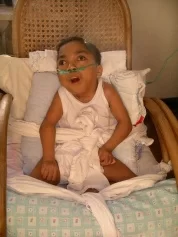 I asked them to reflect on his life. Here is why: I believe that God had a purpose for Luke's life when he created him. I believe that He uses people like Luke to teach us important things. But here is the rub: If we don't spend time reflecting on these lessons, then Luke's life is useless. Its up to us to allow God to make sense of Luke's life.
I asked them to reflect on his life. Here is why: I believe that God had a purpose for Luke's life when he created him. I believe that He uses people like Luke to teach us important things. But here is the rub: If we don't spend time reflecting on these lessons, then Luke's life is useless. Its up to us to allow God to make sense of Luke's life.
And what are the lessons that we found? What has God taught us through his life?
1. First, life is precious. Even though he had nothing to live for, from the world's point of view, Luke clung to live almost ferociously. Some of us who have much more to live for take life casually, we take life for granted. Not Luke. Every day was a struggle. Every breath had to be fought for. Life is a gift from God and we should treat it carefully.
2. God has provided us with opportunities, through Luke's life, to minister to him in significant and life-saving ways. He has provided an avenue for us to live out the biblical mandate to minister unto the "least of these," because, truly, Luke was in that category. Hundreds of people have been given a blessing to participate in the support of CSC that reaches out to children like Luke and many others with other special needs.
3. In so doing, He has given us a chance to show others a Godly value system that doesn't reserve love and attention for those who have something to give back, or who have "potential" or a bright future. For many people who live in a developing country, where resources are limited, this has been a difficult lesson to learn. How could we justify spending so much money for Luke's hospitalization when other, "normal" kids needed care? Luke's life gave us the opportunity to teach about the value of life and about how God looks at all of us.
4. Luke has been a tremendous ambassador for CSC. People around the world remember observing the loving care that he received by our staff and workers. They remember his famous smiles. They may quickly forget the names of the staff or other children, but they remember Luke. "How's Luke doing?" we get asked wherever we go to talk about the ministry of CSC. And our care of Luke helps us explain the true nature and core values of our work in the Philippines.
5. Luke has been a safety valve for those that had an opportunity to know him. My job as Field Director of CSC involves lots of administrative chores, like making budgets, government relations and various kinds of problem solving. There are days when I get stressed out and start to feel the weight of the world on my shoulders. But all I needed to do is to drive a few short miles to where Luke lived, to hold him in my arms, and I get a clear picture of what real struggles are all about. My struggles paled in comparison to what Luke faced every day. Self pity may be easy for some people, but those that knew Luke have no excuse for feeling sorry for themselves. What a great gift that was to all of us.
A little over a week before we left Cebu, Marlys called me on my cell phone and told me that I should get to the hospital quickly, as Luke wasn't doing well. He had been hospitalized for over a week and his breathing was bad. I had gotten messages similar to this one throughout Luke's life, so I went to the office and took care of a few things. But the Lord laid it on my heart to go see Luke and when I entered his room his breathing was extremely labored. He looked different than I had ever seen him, and it became clear that he was dying. I sat down next to him, kissed him and looked into his eyes. For 23 years we had loved this boy. It wasn't easy to say goodbye. I said to him, "Luke. You can go. Go to be with Jesus, Luke. I love you." Within a couple of minutes Luke took his last breath. 23 years of pain, suffering, limitations, hospitalizations, forced breathing, skin rashes and infections were over. We would never see Luke's smile again.
As Luke was dying in that hospital room, I made a promise. I'm not sure if I was making a promise to Luke, to God or to myself. But I decided then and there that I was going to talk about Luke on our coming furlough. I believed then and do now, that the church of Jesus Christ needs to hear about Luke, that the lessons of his life are important ones. Many Americans are complainers - full of self pity. People who have so many material comforts are unsatisfied. American discourse is increasingly a chorus of victim and entitlement claims. Charles Sykes, in his book "A Nation of Victims: The Decay of the American Character" states that, "in a nation where everyone is a victim, no one is a victim." In our preoccupation with our own needs we have a hard time seeing the needs of others – people like Luke.
In his song "God Help the Outcasts," the Hunchback of Notre Dame poses several difficult issues:
I don't know if there's a reason
Why some are blessed, some not
Why the few You seem to favor
They fear us, flee us,
Try not to see us.
The first part we have already examined. The second is our call to arms. "Why the few You seem to favor, they fear us, flee us, try not to see us."
I don't know what factors might make it difficult for us to see the needs of society's outcasts. Perhaps we are too busy. Maybe our personal and church calendars are so full that there just isn't room for Luke, or the man who had fallen to thieves at the side of the road, to break into our day. Maybe we are numbed or fatigued by the needs of others, or simply overwhelmed by the circumstances of our own lives. Maybe we have become cynical. "Why did that guy travel this road at this time carrying that amount of money? He deserves what he got!"
Maybe, just maybe, Luke can help cut through the apathy, the self-centeredness and cynicism of our lives. He was a person with significant needs that he didn't cause. He was totally dependent on others to live. His life had none of the possibilities and opportunities that we take for granted every day. He needed us so very much. Maybe Luke can serve as a symbol of many others that we come into contact with. Maybe Luke can help us rescue our lives.
Sports Fest 2023
Sports Fest is a popular event in every school in the Philippines. Teachers in every institution set a time for planning and preparing for this event. Most schools are excited to find new talents or ways to enhance students' skills in sports.
As a Physical Education teacher at Cebu Children of Hope School, it is fulfilling to see the students' excitement and joyful expression as they participate in each game. Through this activity, it is also fun to see their reaction when they win or lose the game. It is a great opportunity for the teammates and coaches to cheer and encourage the players.
During the competition, there are always mixed feelings. It brings out the best in every team member and sometimes teaches each participant a lesson to learn when the game does not go according to the team's plan.
Here are glimpses of students' experiences during CCHS Sports Fest:
"What I like about Sports Fest are the games like the tug-of-war where you can see the teamwork and support of my team through helping and cheering each other, hula-hoop, jump rope, high jump, and egg toss." – Maribel
"I like playing many games, our team chants, and the refreshment prepared for us by the teachers. I am grateful for the fine weather and the awards that we received at Sports Fest. We were the overall champion and I ranked third in the Running Long Jump III event." – Ryan
"I like to see the faces of the people in the Sports Fest when they are happy. Aside from that, I like the dancing part because every one of us is confident to dance. Seeing us dancing confidently makes me happy." – Jay-em
"I like the tug-of-war because I can see the strength and the joy of my best friends. I am so proud that we are the overall champion of this year's Sports Fest." – Raphael
"I like to watch how my co-players execute teamwork in their respective teams. I am so proud that I ranked 2nd place in the Limbo III event. – Jerame
Sports Fest contributes a big part in their life being a student. When they participate in this event; they will learn lessons that might never happen in the four walls of the classroom.
Toddler Playground
As a young child, my fondest memory with my friends were playing outside with them. Our little neighborhood did not have a playground or enough space to play. Instead, we made use of trees, tall grass, and other people’s vacant lots where we can play slipper game (similar to a kickball but with the use of slipper game). We played hard until our knees were skinned and we were covered with dirt. We were hard work at play.
Play is essential to the development of a child. As Jean Piaget once said “Children require long, uninterrupted periods of play and exploration.” It is in play that a child discovers their self, the people around them, and their environment. That is why at CSC we make sure that play is part of a child’s routine.
I talked about “space” in a previous blog back in 2020. In the Philippines, space is something we don’t care too much about and it’s also something we don’t have much of. I have very good view of the CSC grounds from my office window. I see our children play every afternoon and what a joy it is to see them hard at play.
If you have been here to the shelter, we have a separate playground area for our young children which is located at the back of the Duterte Home. Here, children ages 5 years old and below can play safely and away from the rough play of the older children in the main playground.
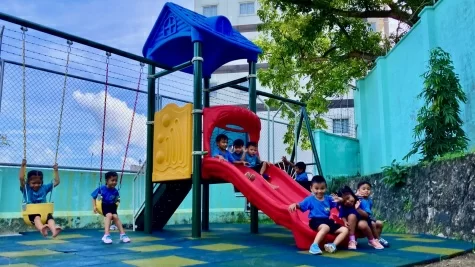
Because of the generosity of our donors, we recently purchased new playground equipment for our young children: slide, swings, and spring riders. I’d like to highlight that the installation of the equipment was made possible by both CSC employees and our older residents. It is one of those moments at CSC where both employees and residents teamed together to make something wonderful.
We held a ceremony before opening the playground to the children. It was a short dedication as the young ones could not wait to try the new equipment; even the older children wanted to try.
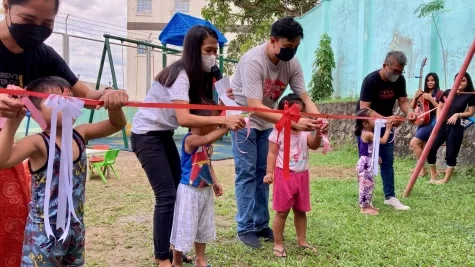
“And the streets of the city shall be full of boys and girls playing in its streets.” Zechariah 8:5 ESV
Check out the kids enjoying the new playgound!
"Kasama"
Kasama is a word in Tagalog that has many meanings, depending on how the word is used in a sentence. As a noun, kasama means "companion, housemate, associate". As a verb, it means "to be together". As an adjective, kasama means "together with, accompanied with, staying with".
You can see kasama used in a very technical sense, like when describing charging cord that is included with your phone or electronic device.

You can also see kasama in a more meaningful context, which is what I'd like to describe to you.
I've heard it said that your neighbor is the one who crosses the road for you. In the parable of the Samaritan and the man who was left for dead, we see that the other two who noticed the man and his condition actually walked on the other side of the road to avoid the man who was desperate for help. But the Samaritan drew near to the man and not only took note of his condition, but invested his time and money to help the man and to see that he was restored to full health.
This is true kasama: together with, accompanied with, staying with.
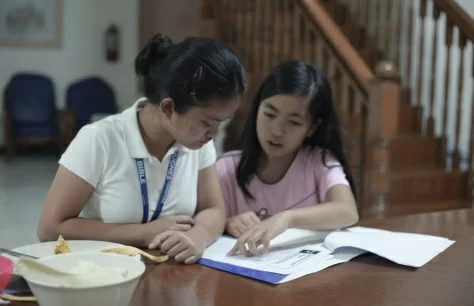
At CSC we strive to be together rather than apart. We have learned that being together helps build community. We can learn from each other and support one another. We can celebrate with and mourn with one another.
This is my hope for us all, that we would model that adjective form of kasama to whomever is in our path today. Let us not see that person as an obstacle or someone to avoid, but as an encounter and someone we are called to care for.
Grace and Peace,
Kirby
The Scent of Joy
By Eric Abellana and Meravic Nalang (Counselors)
Emily Dickinson once wrote that "there is no Frigate like a book." In her poem, she described how a book could ferry us to faraway lands or unfathomable seas. That poem has a lulling melody yet a compelling voice. In counseling, we have different frigates that have helped us guide the children in exploring their faraway lands (future and goals) and unfathomable seas (past and trauma). Talk, art, and music have been a great help for several years in dealing with children in counseling. This year, the mothership was finally realized.
On May 20, the counseling department finally moved to its new space, the Alimyon Hall. Alimyon is a Cebuano word for scent/aroma. Although we use scents/aromas as an aid in counseling, this is not the reason why the space is named Alimyon. We believe that emotions put the colors to our thoughts; behavior is the scent of our emotions—a scent that can be seen rather than smelled. In this new space, play has been the frigate that helps us in dealing with the children. Toys, a lot of them, like sand trays, art materials, and musical instruments are present in Alimyon. These have evoked a lot of emotions from the children.
Joy is the dominant scent here as younger residents dive into their world as they start to play. They become attuned to the present, focusing on the story of their play. For older residents, play allows them to reconnect with their inner child with the help of sand trays. Through their play, we can have a glimpse of what they've been through; where they are going; and what they are hoping for. With smiles on their faces, excitement in their voice, and the calmness of their hearts radiate the scent of joy.
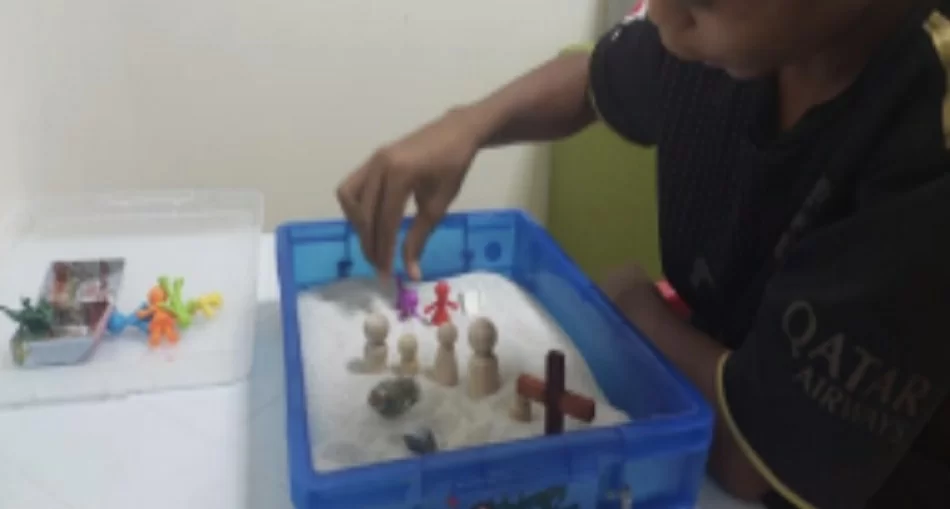 Play has always been the most comfortable language for children. You let them play with toys, and they will tell you a story. You let them play some musical instruments, and you'll hear the anthem of their days. You let them play with colors and they will give you masterpieces that outshine Van Gogh's or Monet's. Emily Dickinson was never wrong about books. They surely ferry you somewhere. Play offers the same to children.
Play has always been the most comfortable language for children. You let them play with toys, and they will tell you a story. You let them play some musical instruments, and you'll hear the anthem of their days. You let them play with colors and they will give you masterpieces that outshine Van Gogh's or Monet's. Emily Dickinson was never wrong about books. They surely ferry you somewhere. Play offers the same to children.
Space and Time to Grow
We are all aware that most living things on our planet need food, water, light, the right temperature, and air to survive. Moreover, they require extensive time and ample space to develop entirely.
One of my former students once passionately shared his dream of becoming a farmer during our morning meeting routine. He even emphasized that he wanted to own the land he would farm. Whenever asked what he wanted to become in the future, he consistently responded: that he wanted to own land he could farm. I was glad to learn that, despite his age, he is highly confident of the dream he wants to achieve in the future and shared with the class the reasons why. It was heart-warming to hear from a student who once struggled to control his emotions in class before, now has made a positive transition with the help of the significant people in his life.
Their home economics and livelihood education class covered gardening during the last quarter of the academic year 2021-2022. As the teacher planned the activity with the students, they expressed considerable interest and showed their eagerness to participate. After weeks of in-depth discussion on the fundamentals of gardening and identifying the necessary tools, it was time to put the lessons learned into practice. The class decided to grow eggplants and agreed that if it produced some fruits several months later, we would have to find a recipe that needed eggplant as its main ingredient.
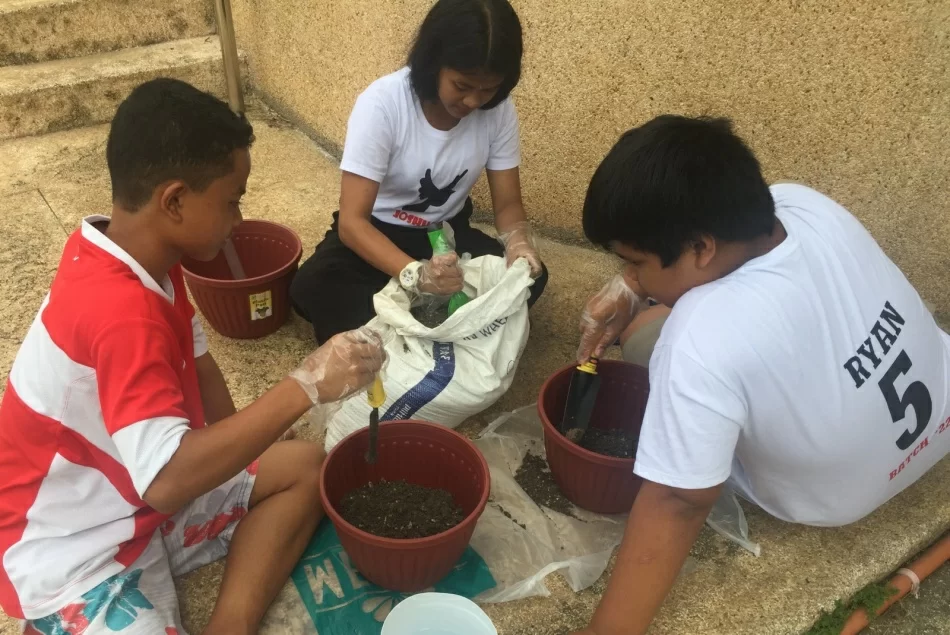
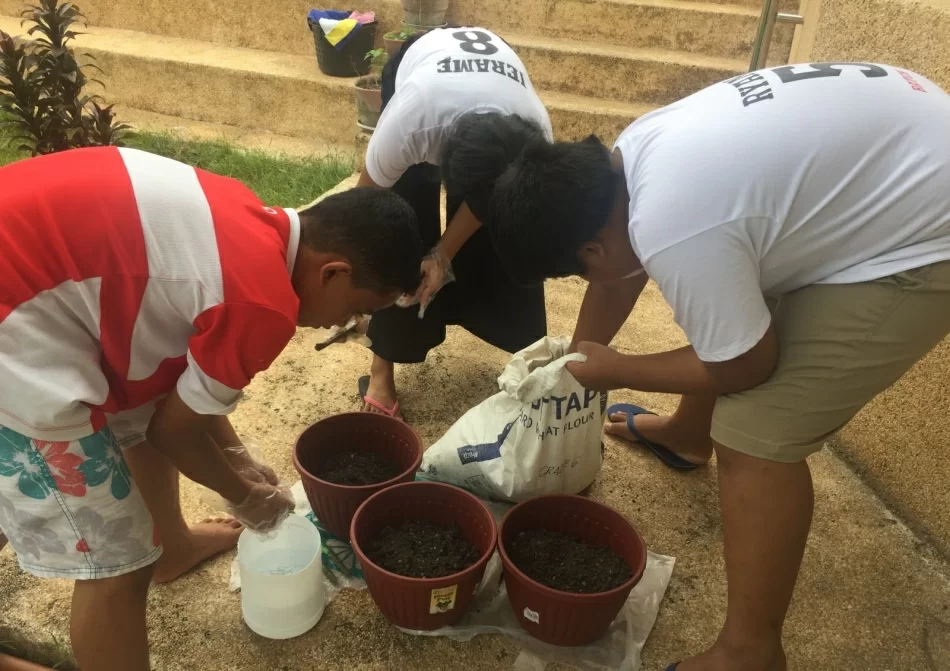 After ten days of care for each of their pot, the seeds began to sprout. It was a success!
After ten days of care for each of their pot, the seeds began to sprout. It was a success!
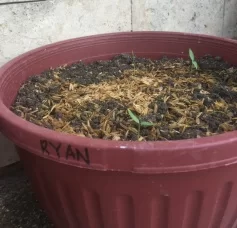
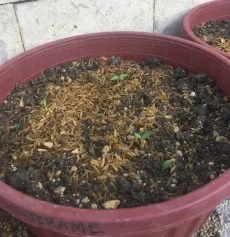
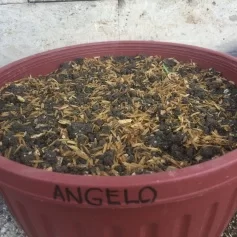
What stood out to me the most as we talked about the lessons they had learned from the gardening activity was that one shared a realization that learning can be enjoyably done both inside and outside the four walls of the classroom.
After six months, my students excitedly shared that the plants were already bearing fruits. They said they had taken good care of their plants during the summer.
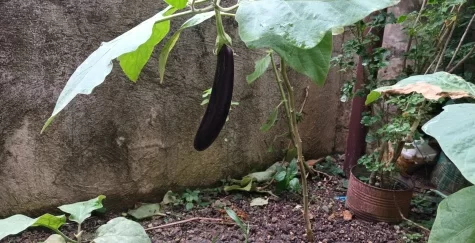
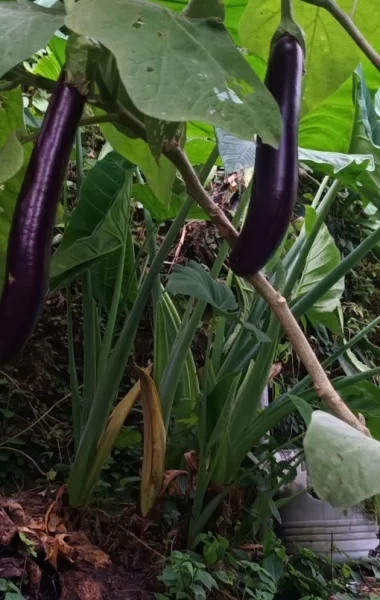
For this school year 2022-2023, two of my former students are still my current students, and the other has moved to high school. That means he was already in a different class. Nonetheless, we invited him to participate in the agreed cooking activity, and he gladly accepted.
So, on September 28, 2022, after obtaining permission to hold the activity at the shelter, we decided to cook "Crispy Eggplant Fries" and "Eggplant Burger Steak."
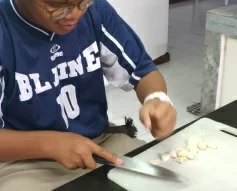
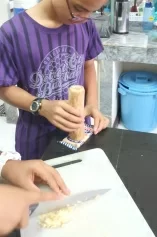
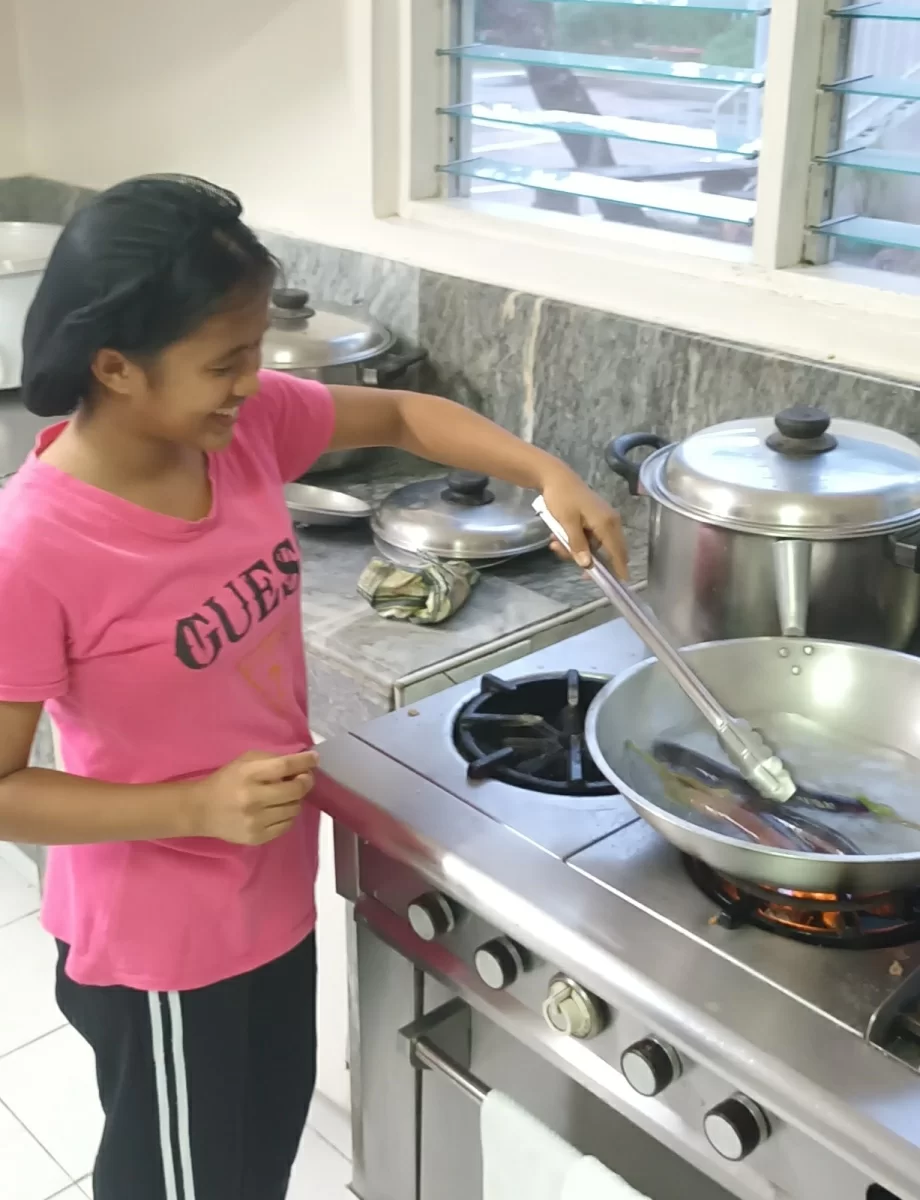
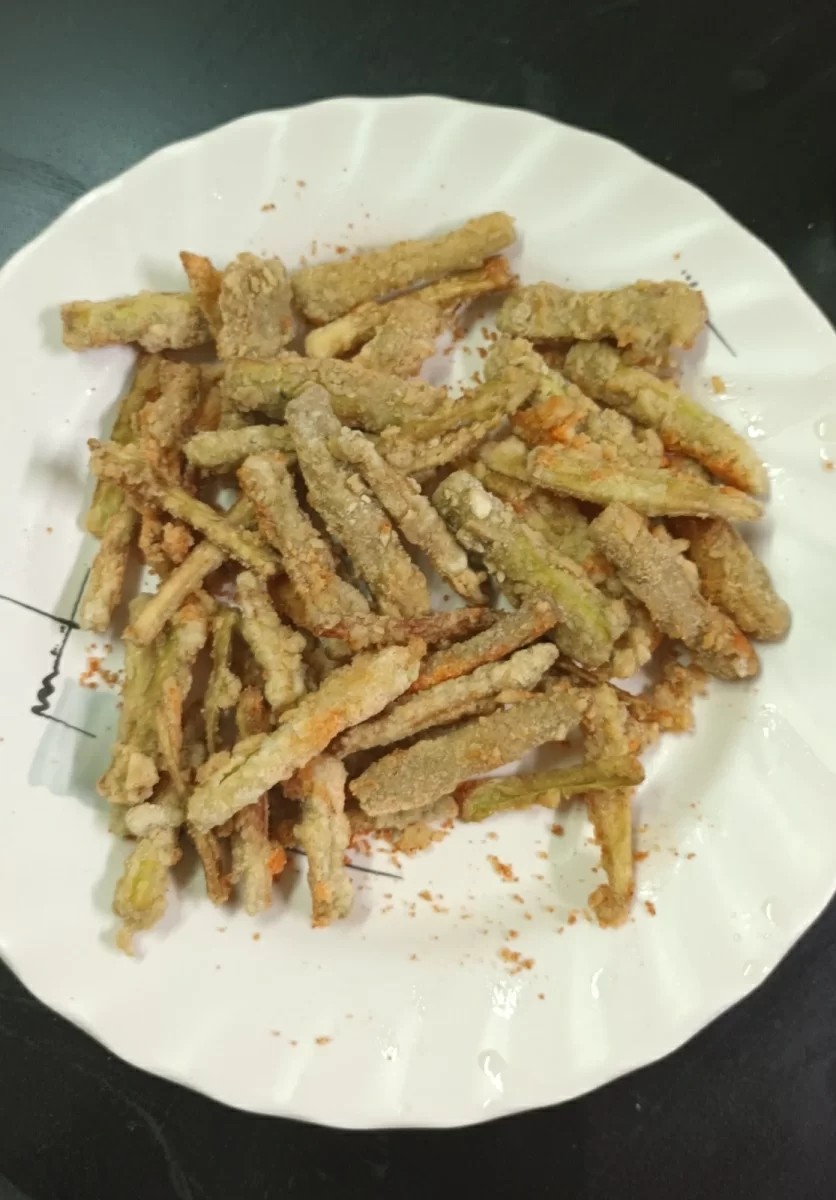
One of the activity's best moments was observing how they accomplished the task, how well they worked together, and how committed they were to their education. I could tell they were delighted to have the eggplants cooked and tasted. The class loved it and expressed interest in giving the recipe to their house parents and designated cook so they could prepare it at home and serve it to the other children. This is an incredibly significant experience for them as kids, and it's great to know that they learn the concept of planting so they may grow their food in the future, whether it's for their consumption or business purposes.
As living things, plants require ample space and time to grow, in addition to sunlight, the right temperature, moisture, air, and nutrients. The same is true with our kids, who face challenges and overwhelming emotions. They deserve not only our love, support, and guidance but also ample time and space for themselves to maximize their full potential and develop the abilities that God has given them.








